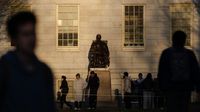President Donald Trump has once again threatened to revoke Harvard University's tax-exempt status, escalating an ongoing feud that has drawn the ire of many lawmakers and legal experts. In a post on Truth Social on May 2, 2025, Trump declared, "We are going to be taking away Harvard's Tax Exempt Status. It's what they deserve!" This statement marked a more direct approach compared to his previous suggestion in April, where he merely hinted that Harvard should lose its tax-exempt status.
The Trump administration has accused Harvard of failing to adequately protect Jewish students on campus, a claim that has fueled the tensions between the university and the White House. Following the administration's demands, which included a list of conditions that Harvard must meet to avoid losing funding, the government froze over $2.2 billion in federal funding to the institution. Harvard's president, Alan Garber, has rejected these demands as illegal, arguing that they threaten the university's independence and educational mission.
In a statement, Garber emphasized, "There is no legal basis to rescind Harvard's tax-exempt status. Such an unprecedented action would endanger our ability to carry out our educational mission. It would result in diminished financial aid for students, abandonment of critical medical research programs, and lost opportunities for innovation." The university has since filed a lawsuit against the Trump administration, asserting that the government's actions violate the First Amendment and proper legal procedures.
Trump's threats against Harvard are part of a broader strategy that has seen his administration target various universities amid rising tensions surrounding antisemitism and political protests on campuses. The administration's task force has sent letters to multiple institutions, demanding compliance with certain policies or risk losing federal support. Harvard's refusal to comply with these demands has led to significant financial repercussions.
Adding to the political drama, some Senate Democrats, led by Minority Leader Chuck Schumer, have called for an investigation into whether the Trump administration is improperly influencing the IRS to revoke Harvard's tax-exempt status. They argue that such actions could set a dangerous precedent for targeting educational institutions based on their political stances.
Meanwhile, the fallout from Trump's executive actions has extended beyond Harvard. A federal judge recently struck down an executive order that aimed to target the law firm Perkins Coie, calling it an unprecedented attack on the judicial system. Judge Beryl Howell stated that no American president has ever issued orders like those targeting a law firm, and she deemed the action unconstitutional.
In addition to these controversies, Trump downplayed concerns regarding potential economic troubles in an interview with NBC News, asserting that the U.S. economy would be "OK" in the long run, even if a recession were to occur in the short term. His comments came amid rising fears about the economic implications of his administration's policies.
As the political landscape shifts, Trump's influence looms large over the upcoming New Jersey governor's race. His endorsement is highly sought after, with candidates vying for his support ahead of the primary on June 10. Political analysts note that loyalty to Trump is a key issue in the race, and his unpredictable nature adds an element of uncertainty.
On another front, the U.S. Army is reportedly planning a military parade to celebrate both its 250th anniversary and Trump's 79th birthday, which fall on June 14. This parade is expected to feature over 150 military vehicles and 50 aircraft, reigniting discussions about Trump's previous attempts to hold a military parade during his presidency, which were shelved due to cost concerns.
In a related development, the Trump administration has asked the Supreme Court to allow the Department of Government Efficiency, led by Elon Musk, to access Social Security data. This request follows a lower court ruling that blocked such access, with the administration arguing that the data is necessary for modernizing government systems and detecting waste.
As the political climate continues to evolve, NPR and PBS are also feeling the effects of Trump's executive order to end public funding for these organizations. NPR's president, Katherine Maher, has vowed to challenge the order, stating that it seeks to deprive millions of Americans of essential news and information. PBS CEO Paula Kerger echoed these sentiments, labeling the executive order as "blatantly unlawful" and threatening the future of public broadcasting.
In summary, Trump's recent actions against Harvard University and other institutions reflect a broader strategy that intertwines education, politics, and public funding. As legal battles loom and political campaigns heat up, the implications of these decisions will resonate far beyond the immediate controversies.





